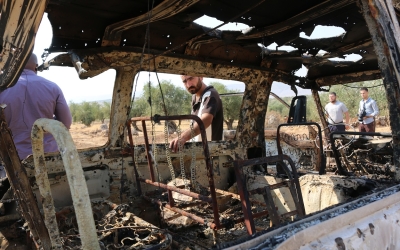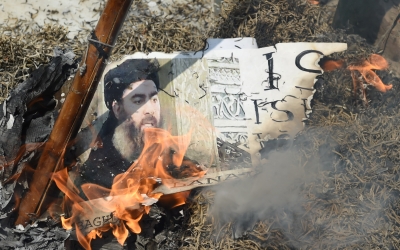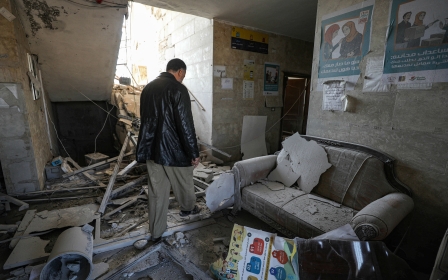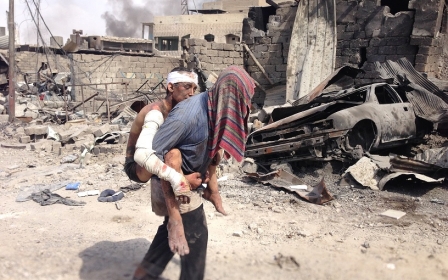After Baghdadi: Will Islamic State fighters seek return to al-Qaeda?
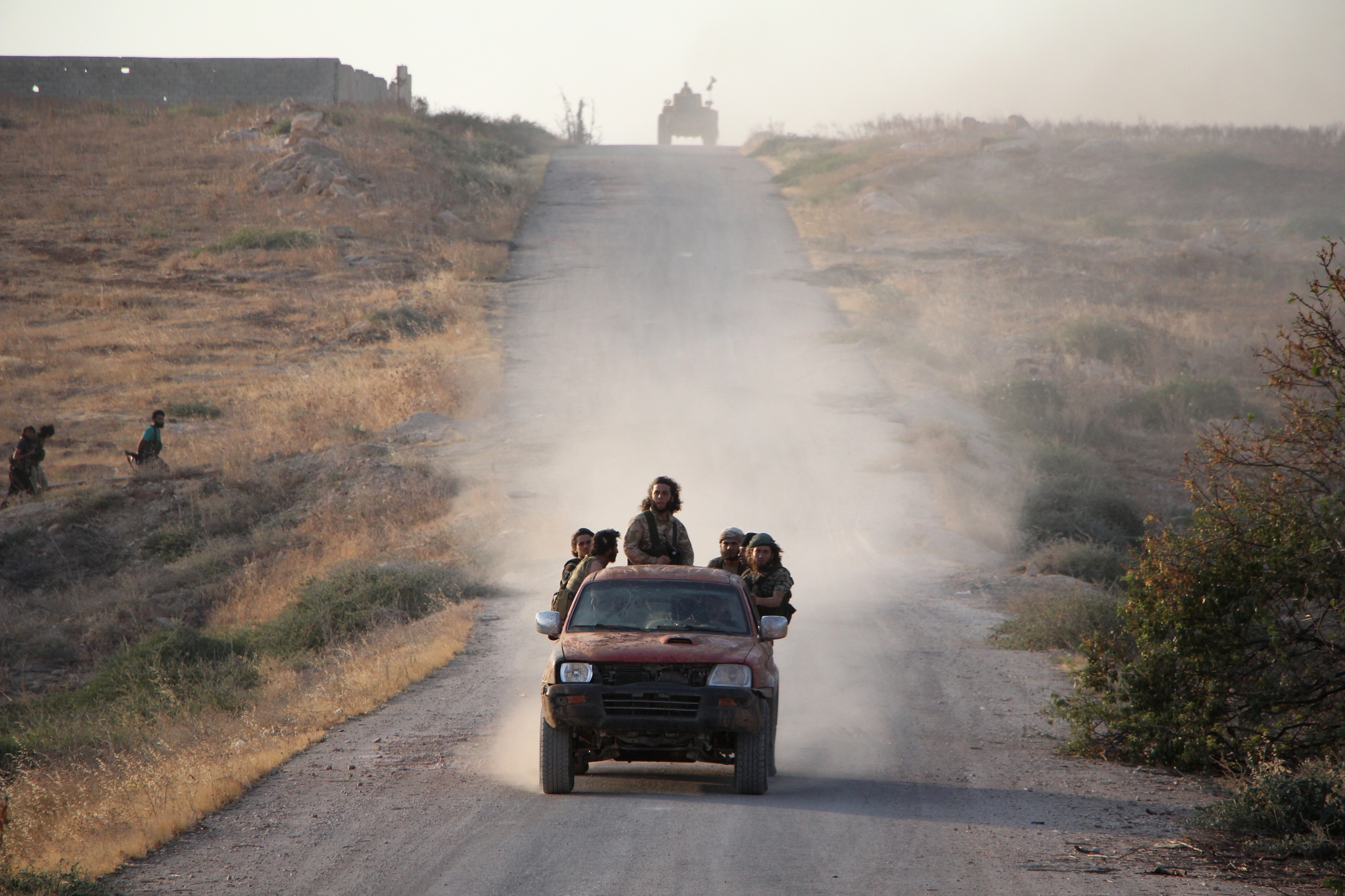
The death of Abu Bakr al-Baghdadi and the appointment of a virtually unknown successor could see some fugitive Islamic State group fighters seeking a return to the ranks of al-Qaeda-aligned groups.
Baghdadi died last month during a raid by US special forces on a compound near the village of Barisha in the northwest Syrian province where he appeared to have been hiding under the apparent protection of one such hardline group.
According to reports, the building where Baghdadi spent his final few months was owned by a people smuggler with links to Hurras al-Deen, or the Guardians of Religion Organisation, which claims allegiance to al-Qaeda.
Several Hurras al-Deen fighters were also reported killed after shooting at US helicopters on the ground, though the operational commander of the raid told reporters last week that they were not believed to have been aware that Baghdadi was nearby.
Despite antipathy and ideological differences, IS had previously been reported to have maintained some contact with Hurras al-Deen, according to receipts obtained by the New York Times from formerly IS-held territory in 2018 which suggested that IS officials paid at least $67,000 to Hurras al-Din members.
One receipt suggested that Hurras al-Deen was involved in preparing bases for fighters escaping from the eastern Deir Ezzor region, prompting speculation that the group was being infiltrated by IS.
But doubts remain about the authenticity and significance of those receipts, according to Sam Heller, an expert on Islamist-inspired militant groups at the International Crisis Group.
He cited analysis posted by Ayman al-Tamimi, a Syrian researcher quoted by the New York Times, which highlighted a notice posted by Hurras al-Deen to all its members in February 2019 warning them about affiliation and contact with IS members. Most of the documents obtained by the New York Times appeared to have been forgeries, Tamimi also said.
"There are ideological differences between ISIS and Hurras al-Deen, but not of great importance," Heller, who is based in Lebanon, told Middle East Eye.
"These groups are not considered cohesive entities. They are made up of people, so it is possible that fighters may be relatives or friends with local connections, regardless of the ideas espoused by the organisation to which they belong," he said.
"Idlib contains a large proportion of displaced Syrians, as well as foreign fighters from abroad who do not have strong ties to the local community, so there are many people nominally associated with Islamic organisations.”
Neither Hurras al-Deen nor Hayat Tahrir al-Sham (HTS), which controls most of Idlib and also contains elements previously loyal to al-Qaeda, has issued any official statement or comment on Baghdadi’s death.
How IS was driven out if Idlib
IS and al-Qaeda-linked groups have been in competition for the loyalties of hardline fighters in Syria ever since al-Qaeda formally disavowed Baghdadi and his organisation in early 2014 following disagreements and fighting between the then-aggressively expanding IS and the Nusra Front.
At the time, Nusra was al-Qaeda’s official affiliate in Syria. But Nusra was also fighting alongside the Free Syrian Army (FSA) and other rebel groups against Syrian government forces under the banner of the Jaish al-Fatah (Army of Conquest) alliance, so it gained great popularity.
After fierce fighting, the FSA and Ahrar al-Sham, another Islamist rebel group that later joined Jaish al-Fatah, withdrew from Raqqa city in eastern Syria in favour of IS, which in return withdrew from Idlib villages.
However, a militant group known as Jund al-Aqsa tried to open a road for IS elements trapped in Rahjan, east of Hama city, to eastern Idlib. Bloody clashes then erupted between Jund al-Aqsa and Ahrar al-Sham fighters.
In a subsequent series of realignments, the Nusra Front then renounced its formal links to al-Qaeda and renamed itself Jabhat Fatah al-Sham, which then became the main force within HTS, a broader militant alliance that currently holds most of Idlib.
But Nusra’s efforts under its Syrian leader Abu Mohammad al-Jolani to distance itself from al-Qaeda were not accepted by all of the fighters in its ranks, and especially not by many of its foreign fighters. Some of these broke away to form Hurras al-Deen in 2017.
HTS continued to crackdown on Jund al-Aqsa, because of concerns that it was harbouring suspected IS cells, leading to the arrest of some of its leaders and the collapse of its stronghold in the town of Sarmin.
Mediating role
So far, Hurras al-Deen has avoided any similarly damaging disagreements with HTS, in part because some of its own leaders are former HTS legislators and because of enduring fraternal ties between fighters on both sides.
But it has also functioned as a mediator between HTS and other hardline groups, and has worked alongside former elements of Jund al-Aqsa who regrouped under the new name of Ansar al-Tawhid.
Hurras al-Deen and Ansar al-Tawhid fighters even currently lead an operations room responsible for repelling attacks by Syrian government forces and their allies on the front lines south of Aleppo and north of Latakia province.
But Hurras al-Deen is seen as lacking charismatic and respected leaders to match those within HTS ranks who would be capable of winning the loyalty of fighters coming from outside Idlib, whether foreign or Syrian.
One such figure is Abdullah al-Muhaisini, a popular Saudi cleric who had previously served as a religious judge for the Jaish al-Fatah alliance but who broke away from HTS in late 2017.
In an audio message published to his followers, Muhaisini welcomed Baghdadi’s death and said he wished it had been Sunni Muslims who had killed the IS leader.
"The night of al-Baghdadi's death is great in the history of Muslims. Baghdadi led Sunni Muslims astray, taking advantage of their emotions towards the glories of Islam," said Muhaisini.
"After Baghdadi, there will come others who will shed the blood of Muslims, under malicious ideas. I wish it was Sunni Muslims who killed Baghdadi."
Return to al-Qaeda?
Yet IS’s appointment of an unknown militant – named Abu Ibrahim al-Hashemi al-Quraishi by IS’s Amaq news agency - as Baghdadi’s successor has led to speculation that some IS loyalists who have made it to Idlib could prefer to switch their allegiances to Hurras al-Deen.
Such a move would effectively mean a prodigal return to al-Qaeda's tutelage and would likely require the endorsement of al-Qaeda leader Ayman al-Zawahiri, who has yet to make any public comment on Baghdadi's death.
“At this stage we may only see the return of some individuals to al-Qaeda,” Samir Nashar, a Syrian opposition leader based in Turkey, told MEE.
“Extremist Islamist groups do not know unity or integration, their history is full of defections that increase the risk of further radicalisation and extremism in new groups," he said.
Nashar said that hardline Islamist militant groups would continue to thrive in Idlib and elsewhere in the Middle East as long as they could continue to claim to defend Sunni Muslims affected by the region’s conflicts.
"Jihadist groups claim to defend persecuted Sunni Muslims," he said.
“But authoritarian regimes are reaping significant benefits from this, by gaining the support of the international community. On the other hand, some countries are using these jihadists to achieve their own political interests."
Last enclave
Beyond any short-term realignments as a consequence of Baghdadi’s death, however, Nashar said he believed that both IS-linked militants regrouping in Idlib and al-Qaeda-linked fighters would eventually face the same choice as those who made a final stand in the village of Barghouz on the banks of the Euphrates in eastern Syria earlier this year.
Idlib is now the last enclave of Syria outside of government control. As well as enduring Syrian government and Russian air strikes and ground assaults, Hurras al-Deen and Ansar al-Tawhid have also found themselves in the crosshairs of the US-led anti-IS coalition.
In August, at least 40 militants belonging to Hurras al-Deen and other groups including Ansar al-Tawhid were reported killed in a coalition air strike in Idlib. In June, eight Hurras al-Deen fighters including six commanders were killed in a coalition missile strike.
And in September, the US State Department offered a $15m bounty for information leading to the location of three senior Hurras al-Deen leaders: Faruq al-Suri, Abu Abd al-Karim al-Masri, and Sami al-Uraydi.
“The fate of foreign fighters in Idlib will be no different to the fate of the fighters in Barghouz. That is, fighting to the end or being captured, except for a few who can infiltrate the surrounding countries,” Nashar said.
Middle East Eye delivers independent and unrivalled coverage and analysis of the Middle East, North Africa and beyond. To learn more about republishing this content and the associated fees, please fill out this form. More about MEE can be found here.


